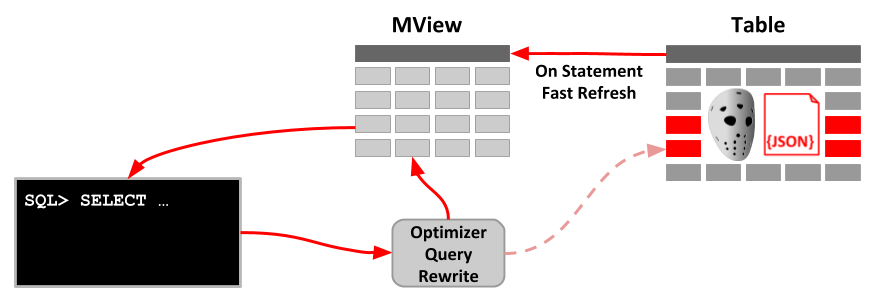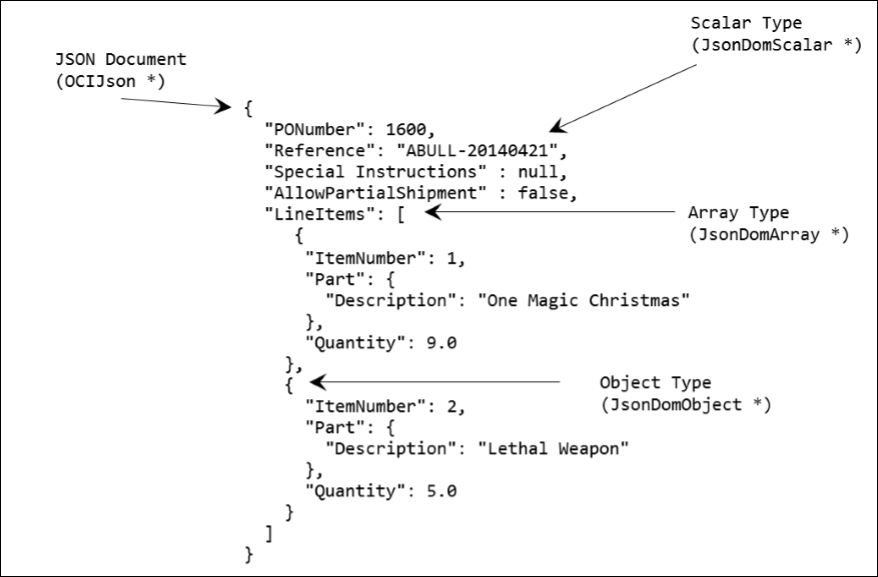

type' WITH WRAPPER) FROM jpurchaseorder JSONQUERY as JSONTABLE SQL/JSON function jsonquery can be viewed as a special case of function jsontable. select ID, t1.*, t2.* from DUMMY1 d, json_table(d.doc1, '$'Ĭolumns (x VARCHAR2(10) PATH '$')) t1, json_table(d. Example 16-1 Selecting JSON Values Using JSONQUERY SELECT jsonquery (podocument, '.ShippingInstructions.Phone. With the latest cxOracle (now called python-oracledb), there is a one-liner to get the performance benefits, see the doc. ) And in cases where the row path expression is only '', which targets the entire document, you can omit that second argument altogether. ) jsontable (t.j.ShippingInstructions.Phone.

Returns one record select ID, t1.*, t2.* from DUMMY1 d, json_table(d.doc1, '$'Ĭolumns (x VARCHAR2(10) PATH '$')) t2 WHERE t1.x = '23456' AND t2.x='EFGH’ Use RETURNING CLOB but follow this cxOracle doc so that you don't have to call c.read() which is slow. For example, these two queries are equivalent: jsontable (t.j, '.ShippingInstructions.Phone '. SELECT firstname, lastname, j.address.street, j.address.city, j.address.state, j.vehicleinfo. Q'#]. version: Oracle Database 12c Standard Edition Release 12.1.0.2.0 - 64bit Production CREATE TABLE DUMMY1 (id int NOT NULL PRIMARY KEY, doc1 VARCHAR2 (200), doc2 VARCHAR2 (200), CONSTRAINT dummy_json1 CHECK (doc1 IS JSON), CONSTRAINT dummy_json2 CHECK (doc2 IS JSON)) The example queries presented in this section demonstrate the use of Oracle JSON operators to execute queries similar to those presented in the previous section using Oracle regular expression functions.

d definition oracle json uery example stack overflow questions Sequelize query to order by deeply nested JSON. Select json_value(body, '$.sections[#' || i || Oracle json query example stack overflow. If in fact you are indeed only extracting two scalar values from a very large document, two calls to JSON_VALUE() may be justified, especially if the document is much larger than shown here but if you are extracting many scalar values from a document that is not too complicated, then a single call to JSON_TABLE() may be better, even if in the end you don't use all the data it produces.Īnyway - as an illustration of native dynamic SQL, here's the alternative solution (using MT0's table): declare Depending on the actual requirement (I assume the one in your question is just for illustration) and the size of the document, it may be more efficient to make a single call to JSON_TABLE(), as illustrated in MT0's answer. However, note that this approach makes repeated calls to JSON_VALUE() over the same document. PL/SQL has an answer for that - native dynamic SQL, as demonstrated below. So, the problem is that you want to loop over an index (to go diagonally through the array of arrays, picking up just two elements) - but the JSON_* functions don't work with variables as array indices - they require hard-coded indexes. (Note: the indexes from FOR ORDINALITY are 1 higher than the array indexes in the JSON path.) Or, you can just use a query: SELECT section_index, capsule_index, time INSERT INTO bodycontent ( body, contentid ) VALUES ( Which, for the test data: CREATE TABLE bodycontent ( body CLOB CHECK ( body IS JSON ), contentid NUMBER ) 1 Answer Sorted by: 0 I would avoid the cross-product and use something like the following.


 0 kommentar(er)
0 kommentar(er)
